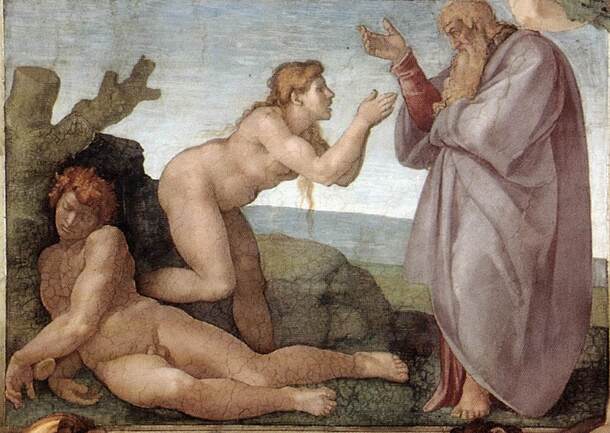|
Throughout Paternal Tyranny, Tarabotti argues that when men force women into nunneries, they act contrary to God’s will and strip women of their deserved freedom. She argues first that, as seen in Adam and Eve’s creation, God made men and women equal in value and in their possession of a free will. She writes,
"If woman had been deprived of freedom’s bounty, God would not have given her to man, since she is “A help like unto himself” (adiutorium simile sibi) (Gn 2:18). God furthermore did not give woman to man as a help inferior to himself; woman’s creation was one of parity…both were made similar in knowledge and with equal claims to eternal glory. As soon as His Majesty said the word “help,” He immediately added, “like unto himself,” implying that woman is of just as much value as man." (50) Tarabotti utilizes the creation narrative to defend God’s intent in the making of women. She challenges a reading of the creation story where Eve is inferior to Adam because she was made as a “help” to man. Tarabotti argues that the language found in Genesis during this moment of creation reveals the true and equal value of women. According to Tarabotti, the creation of men and women “was one of parity” where both parties were made equal in “knowledge and with equal claims to eternal glory.” Most importantly, God also made “the human will… free and autonomous for all” (127). Men who make “use of holy pretexts,” such as the creation story, to defend their oppression of women, then, “have no regard for God’s will in any manner” (127). Likewise, when men force women to live in convents, they defy God and “dare to endanger free will” (43). Tarabotti argues that in this state of imprisonment, women “possess no less than [men] all the advantages of free choice, which can be taken away only by death; yet [men] still condemn them to a living hell” (81). Despite always possessing their God-given free will, women forced into convents cannot act freely: they are “restrict[ed]… to one place” and must uphold “cruel obligations” and religious vows (81). As a result, these women live only as “imprisoned bod[ies]” (54). Tarabotti compares the men who oppress women in this way to “Satan” because they “crave greater glory than God’s by taking away free will from women” (54). In taking away the freedom of women, men reject God’s will which calls for both sexes to live freely and impose their own wills onto the world instead. In doing so, men also push women further away from God. Instead of growing in their love for God while in the convents, women “blame God who permits but does not agree with their fates” (129). Men who force women into convents “dispose of their wills” and cause them to lose faith (81). In stripping women of their freedom, Tarabotti concludes, men defy God who intended free will to be enjoyed by both men and women. --MP Source info: Paternal Tyranny. Edited and translated by Letizia Panizza. The University of Chicago Press, 2004. Image info: Creation of Eve. Painted by Michelangelo. Cappella Sistina, Vatican, 1509-10. Source: https://www.wga.hu/html/m/michelan/3sistina/1genesis/5eve/05_3ce5.html
0 Comments
Leave a Reply. |
Authors
Jacinta Shrimpton is a PhD student in Philosophy at the University of Sydney. She is co-producer of the ENN New Voices podcast Archives
May 2024
Categories
All
|

 RSS Feed
RSS Feed